contents
A Letter from the Dean
Public Offerings
NYU Stern, The Economist, and CFR.org talk global issues in the ’08 campaign; scholars and industry chiefs take the pulse of the credit crunch; how managers of hedge funds and quant funds find value; After Market Hours speakers reflect two sides of the entertainment industry; Marc Rotenberg sounds off on privacy in the Google era; and former UN Special Envoy Stephen Lewis rails at poverty and disease in Africa
Stern in the City
Developer Joe Sitt’s bold vision for Coney Island, By Jenny Owen
Ros Stephenson leads at Lehman Brothers Corporate Finance, By Rika Nazem
Going Short and Winning Big
8 questions for John Paulson
Cover Story – The Values Proposition
NYU Stern prizes a well-rounded education that teaches about business and its role in society, not just how to maximize shareholder value, By Thomas F. Cooley and Doug Guthrie
Special Feature – Building Connections
A dramatic facilities renovation brings the campus up to par with its growing reputation, By Marilyn Harris
Leading Indicators
Stern’s CEO Series: Doug Conant of Campbell Soup talks about reviving the iconic consumer food giant, and John Mack of Morgan Stanley reports on global trends in the finance industry
Prospectus
New faculty appointments, noteworthy papers, awards, and honors
Office Hours –
Faculty
Research
The Subprime Mortgage Crisis
Early signs of a credit crunch were hidden, but discoverable,
By Yuliya Demyanyk and Otto Van Hemert
Does Chatter Matter?
Record industry marketers may want to tune in to the Web to spark album sales, By Vasant Dhar and Elaine Chang
Paying a Premium
The faulty assumptions consumers make that lead them to overspend on insurance, By Zur Shapira and Itzhak Venezia
|
PEER TO PEER
Student Life in Washington Square and Beyond:
Doing good in Costa Rica, creating an interactive résumé, going green in Washington Square, and lending “social dollars”
Alumni Affairs
Alumni News and Events: Community-building initiatives, professional resources for alumni, the first Alumni Business Conference, and alumni in Los Angeles
Class Notes
Past Performance
Charles Waldo Haskins, accounting evangelist and Stern founder, By Marilyn Harris |
|

Global Issues in Campaign '08:
NYU Stern, The Economist, and CFR.org Discuss Trade, Energy, Immigration, and America's Image
|
Top: (From left to right)
Robert McMahon, Dean Thomas Cooley, Amity Shlaes, and Matthew Bishop discussed global trade.
Bottom: Mike Moran (left) moderated the second panel discussion on energy and the environment with (from left to right) Vijay Vaitheeswaran, Mark Tercek, and Elizabeth Economy. |
|
|
Last November, NYU Stern inaugurated a series of panel discussions about major issues in the 2008 US presidential campaign. The debut panel, moderated by Robert McMahon, deputy editor of CFR.org, the outreach arm of the Council on Foreign Relations, consisted of Stern Dean Thomas F. Cooley; Amity Shlaes, senior fellow for economic history at the Council; and Matthew Bishop, editor and New York bureau chief for The Economist. Global trade was the subject, with nearly 400 business people, Stern students and alumni, and members of the greater NYU community in attendance.
The panelists agreed that global trade benefits the US economy, while addressing why the general population continues to be pessimistic about globalization and why the candidates have not made the issue a priority in their campaigns. “We are seeing some of the dark side of globalization and trade in a very real way with regard to poison-tainted Chinese toys,” observed Dean Cooley. “Why is it politically popular to jump on this issue rather than stand up and talk about the incredible benefits of free trade? Because it’s very easy to concentrate on who loses from trade, such as those who have lost jobs because of NAFTA, and it is very difficult to pinpoint who the many beneficiaries are.”
The relative absence of discussion on the trade issue by candidates and corporate thought leaders alike was noted by both Shlaes and Dean Cooley. Bishop questioned whether if Hillary Clinton were elected she would adopt the “remarkably positive” free-trade policy of her husband’s administration. “I think most people believe she understands the economics of free trade and may find reason to embrace it more aggressively in office” than she has done in the campaign, he said.
Bishop explained his position that free trade should be a mantra for the US. “America is playing globalization better than any other country in the world,” he said. “Its companies are the most innovative in the world, leading the profit-making from manufacturing outsourcing in China, as well as the business process outsourcing in India.”
In December, the second panel in the series discussed energy and the environment. The panelists were Mark Tercek, managing director at Goldman Sachs and adjunct professor at Stern; Vijay Vaitheeswaran, a reporter for The Economist who teaches at Stern; and Elizabeth Economy of the Council on Foreign Relations. Mike Moran, executive editor of CFR.org, moderated. Issues included climate change, the role of business in effecting change, and China’s role in global energy investment and security.
Moran launched the discussion by announcing that Australia had received a standing ovation that week at the UN climate change meeting in Bali when it agreed to ratify the Kyoto Protocol. What can the next president do, he asked, to propel the US – now the sole wealthy nation not in the pact – into a leadership role in the movement to reduce global warming? Tercek stated that since the US is the largest emitter of greenhouse gases, presidential candidates should take a stand. However, although regulation would give industry the guidance to make smarter, long-term investments in alternative energy, he admitted it would be political suicide for a candidate to propose caps or taxes on carbon emissions that impose a significant short-term cost. Vaitheeswaran pointed out that Republican governors in California, New York, and Massachusetts have already enacted environmental policy, but affirmed that a broad national policy is needed.
On the topic of energy security and independence, Economy observed that China and the US both subsidize gasoline, though Chinese subsidies are larger. The urbanization of China will increase demand 350 percent by 2030 as 400 million people move from rural areas, she said. China has suggested the US and other developed nations share renewable-energy technology with poorer nations for free, an idea the US is resisting.
With millions of legal and illegal immigrants in the country, immigration is a hot-button topic in the current US presidential campaign, and it generated a free-wheeling discussion at the third panel discussion, which was moderated by Dean Cooley, and held, appropriately, on February 5 – “Super Tuesday.” “The Immigration Balancing Act: Border Security, Cheap Labor, and US Jobs” was the title of the event, with panelists Edward Alden of the Council on Foreign Relations; Adam Roberts, news editor for Economist.com; and Cristina Rodríguez, associate professor of law at NYU Law School.
Alden posited that the events of September 11, 2001, had raised the issue of border security and naturalization policies to an inflammatory level. Rodríguez, calling the immigration issue a manufactured crisis, nevertheless acknowledged the economic burden on state and local governments imposed by illegal immigrants who access educational and healthcare resources.
Roberts described how immigrants from south of the border used to spend six months in the US and six in their home countries but that now, with hardened borders, they are more inclined to bring their families and remain in the US. When asked about the value of erecting walls or fences to prevent illegal immigrants from crossing US borders, Roberts asserted no wall would be effective. Instead, he suggested, the solution to deterring illegal immigrants is to crack down on the employers who hire them. Alden added that about 40 percent of illegal aliens enter this country legally, coming in by air and staying with lapsed visas.
Cooley asked the panelists to depict the different policies the presidential candidates might adopt if elected. The consensus was that a McCain administration would likely address the immigration issue, while a Clinton or Obama presidency would focus more on health care than immigration. The panelists agreed the next president should focus on creating a new immigration system, open the dialogue with Mexico and the international community, invest in neighboring countries, and separate the issue of immigration from that of security.
The fourth panel discussion in the series, entitled “Brand America: Can the New President Rescue America’s Image?,” was held in March. The panelists were Peter David, foreign editor of The Economist; Walter Russell Mead, the Henry A. Kissinger Senior Fellow for US Foreign Policy of the Council on Foreign Relations; and Craig Calhoun, University Professor of the Social Sciences and director of the Institute for Public Knowledge at NYU. CFR.org’s McMahon moderated the discussion.
The entire panel agreed that the Bush administration leaving office will no doubt improve America’s brand, but each panelist offered different ideas on what steps the next president should take to undo the damage.
Mead thinks the next president has a very difficult task ahead of him/her because “what is in the interests of the US isn’t always what is in the interests of the rest of the world, and unless there is a dramatic shift in US foreign policy, not much will change to improve America’s image.”
Calhoun’s advice to the next president is to not act as a rogue superpower, but to use diplomacy all over the world. He stressed that public relations alone will not save the US image, but action in a variety of areas, from the Kyoto Protocol to the International Criminal Courts, is necessary.
What is at stake if America cannot change its image? David believes America’s ability to mobilize other countries to cooperate in US foreign policy interests such as Iraq and the rest of the Middle East relies on gaining support from foreign governments. While it appears as if pro-American governments are coming back (e.g., Sarkozy in France, Merkel in Germany), they still have to “sell” their policy positions to their electorates, who are not pro-American. According to David, immediate wins for the next US president would be to dismantle Guantanamo Bay, extend the ban on torture to the CIA, and sign on to the Kyoto Protocol or develop a comparable global warming initiative.
Market Pulse Event Centers on the Credit Crunch and Subprime Crisis
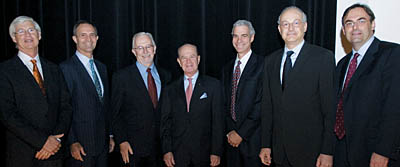
(From left to right) Panelists Robert Engle, Mark Patterson, Dean Thomas Cooley,
Edward Altman, Mickey Levy, Paolo Pelligrini, and Matthew Richardson.
|
NYU Stern's Office of Alumni Relations & Development, the NYU Stern Alumni Council Finance Committee, and the Stern Salomon Center for Research in Financial Institutions and Markets co-hosted a Market Pulse panel discussion in the fall on the subprime credit crisis. More than 550 NYU Stern alumni, students, and industry leaders gathered to hear from expert researchers and practitioners on the topic, including the role of the Federal Reserve, the impact of subprime defaults on the real economy, financial market volatility, and the credit crunch. The Market Pulse series was developed by NYU Stern to pair scholars and industry chiefs in leading a timely dialogue on current market issues.
“We consider business the most important driver of social change, and it is our responsibility as educators to be leading the dialogue on how business affects society,” said Dean Thomas F. Cooley. Panelists included: Edward Altman, Max L. Heine Professor of Finance; Dean Cooley; Robert Engle, Michael Armellino Professor of Finance and 2003 Nobel laureate; Mickey Levy, chief economist, Bank of America Corporation; Mark Patterson (MBA '86), chairman and co-founder of MatlinPatterson Global Advisers; and Paolo Pellegrini, managing director, Paulson & Co., Inc. The moderator was Matthew Richardson, Charles Simon Professor of Applied Financial Economics and Sidney Homer Director, Salomon Center at NYU Stern.
Over the last few years there have been three characteristics of credit markets: an abundance of credit, low spreads, and loans issued under loosening standards. The market for collateralized debt obligations (CDOs) experienced exponential growth, mainly from leveraged loans. At year-end 2005, residential construction began to fall, and around September 2006, there was an increase in subprime delinquencies. All of this had, and still has, an affect on hedge fund trades. Pellegrini’s and Patterson's firms are both players in the credit markets, and both agreed that the impact of this situation will be felt for a while. Pellegrini declared this a genuine credit crisis, not a liquidity crisis, and said there is “froth” in the market.
Engle asserted that while current market volatility is high relative to the last several years, it is not as high as in the period from 2000 to 2002. He explained that while big banks like Citi and Merrill Lynch, which both took large write-downs because of their subprime exposure, are big enough to absorb the hit, they are clearly not insulated from fraudulent loans, poor risk management, and securitized loans. He also noted that there is difficulty in tracing borrowers.
Patterson explained that the current situation likely happened because investors weren't correlating structured investment vehicles with housing loan data, for instance, and, therefore, did not not fully comprehend the scale of what was happening. Dean Cooley and Levy provided macroeconomic perspectives, commenting on the Federal Reserve System's decision to cut the federal funds rate and revive the discount window to reassure markets that the Fed would provide support. Dean Cooley, explaining that the Fed was created to promote the stability of the banking system, said that the Fed's actions create moral hazard and are disingenuous. Levy cautioned that as finances unwind, so, too, will the housing market. |
Activist Investor William Ackman and Quant Extraordinaire Jim Simons Kick Off Chats with Financiers Series
|
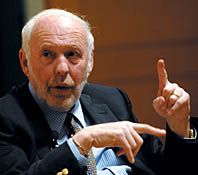 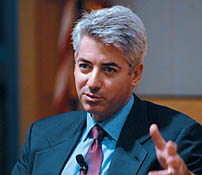
Jim Simons (left) and William Ackman discussed founding and
managing a quant fund and hedge fund, respectively. |
The NYU Stern Alumni Council Finance Committee and the NYU Stern Salomon Center for the Study of Financial Institutions recently launched the Chats with Financiers events to pair top Stern faculty members with luminaries in the finance industry for discussions on personal experiences and current trends in finance. The speaker for the first in this series was activist investor William Ackman, founder of Pershing Square Capital Management, a $6 billion hedge fund, who spoke to Stern alumni, students, and friends. William Allen, the Jack H. Nusbaum Professor of Law and Business at NYU Stern and director of the NYU Center for Law and Business, interviewed Ackman, one of the most influential and successful investors in the industry, who spoke frankly about his investing philosophy and what it takes to succeed in a business that is reputation-sensitive.
Ackman explained that the hardest thing about his profession is locating the idea or the opportunity that will create enormous value. He spoke about his recent 9.6 percent stake in Target Corporation as well as his interests in Sears and Wendy’s, and touched on Pershing Square’s hand-crafted, old-fashioned investment strategy. Pershing invests in only a handful of deals a year, which Ackman said allows it to concentrate on creating value.
Ackman cited his father, a real estate investor, and Warren Buffet as two influences on his own career. When asked about the characteristics he looks for in hiring, Ackman said that he seeks trust, confidentiality – because of the nature of the business – and admiration. He advised the audience to do something they love and pursue their dreams, noting that there are other rewarding jobs besides investing.
He then responded to various questions from the audience including those on stock multiples, the hedge fund he started after business school, and his non-retail investment interests. He advised the audience that when investing, tell the truth, do the homework, and be economically rational.
The second Chats with Financiers event welcomed Jim Simons, founder of Renaissance Technologies LLC, who spoke to an audience of Stern students and alumni. Renaissance Technologies uses quantitative models to trade and currently has more than $30 billion under management, making it one of the world’s largest quant funds. Simons was interviewed by Robert Engle, Michael Armellino Professor of Finance at NYU Stern, director of the Center for Financial Econometrics, and 2003 Nobel laureate.
Simons uses computer models, scientific evidence, and quantitative trading methods to trade. He recounted how he entered the investment field without a notion that trading could be mathematical and gradually came to realize he had no idea how to build a sizeable business based on fundamental trading. He believes that what he does is more like science than math, likening economics to astronomy, in that one collects data and makes informed deductions. Simons then touched on the subprime mortgage crisis, which had what he described as a domino effect of liquidation on financial markets, though he believes the fallout will be finite. He then discussed what his firm looks for in potential employees: ideally, a familiarity with statistics and optimization methods.
Simons is also the founder and chairman of Math for America, a nonprofit organization with a mission to significantly improve math education in the nation’s public schools. He answered audience questions about his firm’s intellectual property; the role of hedge funds in the market; the lack of human intervention in his firm’s trading strategy; and characteristics of success, which he said include good luck. |
Six Degrees of Separation: After Market Hours Series Features Entertainment Magnates Lorenzo Fertitta and Jim Kohlberg
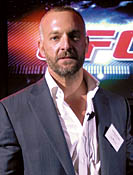 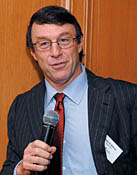
Lorenzo Fertitta (left) discussed his career in gaming and mixed martial arts; Jim Kohlberg talked about his career in private equity and film production and financing.
|
NYU Stern alumni Lorenzo Fertitta (MBA ’93) and Jim Kohlberg (MBA ’89) discussed their careers in the entertainment industry with intimate groups of alumni and students during the latest After Market Hours events, which are part of a series hosted by the NYU Stern Dean’s Executive Board that showcase successful alumni and their diverse and creative careers. In November, the third After Market Hours event featured Fertitta on: “From Slot Machines to Ultimate Fighting.” In the Commons of Stern’s Kaufman Management Center, which was transformed into a sports arena complete with black-curtained walls, flat-screen televisions, strobe lights, a stage, and a full bar, Fertitta spoke candidly about his ultimate fight to build Station Casinos, of which he is president and vice chairman, and to launch the US’s premier mixed martial arts association, Ultimate Fighting Championship (UFC).
Fertitta explained how Station Casinos, founded by his father in 1976 with Palace Station Hotel and Casino, has become the fifth-largest gaming company in the US, with 16 casinos and a market value of approximately $4.8 billion. The company provides Las Vegas with not only gaming but also restaurants, nightclubs, movie theatres, and bowling alleys. He described how he has positioned the company to take advantage of the area’s explosive growth. Las Vegas is now the largest retirement community in the country, thanks to its mild climate, entertainment opportunities, and, not least, lack of city and state income tax.
He also described how, after acquiring the struggling martial arts association, he led the UFC to become the top-rated cable sports program, staging the largest pay-per-view event in North America. His strategy included improving the sport’s reputation by lobbying for additional regulation, spearheading promotional efforts such as “The Ultimate Fighter” Spike TV reality show, and expanding merchandising. Fertitta said that the greatest opportunity for growth is overseas, because, unlike many other sports, fighting is understood by all cultures. He also detailed how new media such as the Internet, cell phones, and iTunes downloads would complement his growth strategy.
Two nights after his presentation, Stern alumni and students joined him at the East Coast Ultimate Fight at the new Prudential Center in Newark, NJ.
From another corner of the entertainment industry, the After Market Hours series next welcomed Kohlberg, who’s found the nexus between finance and film that works for him. Kohlberg spoke to a small group of Stern and NYU Tisch alumni, faculty, students, and former classmates from his EMBA 1989 class about both the private equity firm he founded with his father nearly 20 years ago and his newest venture as head of the film production and financing firm Essential Entertainment. The audience was also treated to a sneak peek at Essential Entertainment’s film, “Trumbo,” a 2007 Toronto International Film Festival Real to Reel selection.
Introduced by Steve Zelin (MBA ’91), senior managing director of the Blackstone Group LP and chairman of the Dean’s Executive Board, Kohlberg spoke about founding and leading his private equity firm, Kohlberg & Co., a middle-market buyout firm. During the 15 years that he was managing partner, he was able to explore his interests outside finance, particularly film, and was determined to create an environment for pursuing them. In early 2007, he launched Essential Entertainment. Kohlberg retains his affinity for media and technology companies and noted his recent appointment as an alternate nominee to the board of The New York Times.
Before showing clips of “Trumbo,” Kohlberg discussed the movie’s subject, Dalton Trumbo, a screenwriter who was one of a group of movie industry professionals questioned by the government during the McCarthy hearings on the influence of Communism in Hollywood. Eventually blacklisted by the industry, Trumbo fought to receive credit for his work. Kohlberg is credited as a producer on the film, which features actors Joan Allen, Michael Douglas, and Nathan Lane. The film will be distributed theatrically this spring by Samuel Goldwyn Films.
Kohlberg answered audience questions on topics including the impact of the Internet on movie distribution and viewing, which Kohlberg said was still evolving; the relative ease of securing an all-star cast for his movie because of its subject matter; and Wall Street’s investment in films, which has historically been a mixed bag, but with Hollywood capital constrained, could now become more commonplace, according to Kohlberg. |
Google, Privacy, and Social Responsibility: The Third Annual Haitkin Lecture
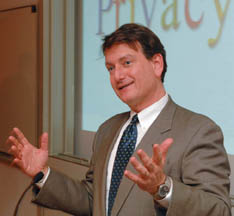
In his Haitkin Lecture, Marc Rotenberg argued that Google's merger with DoubleClick is a considerable threat to consumer privacy. |
Privacy? A slide featuring just this word in the font and primary colors of the ubiquitous Google brand served as the opening of Marc Rotenberg's social responsibility talk, in which he argued that Google's proposed merger with Internet advertising company DoubleClick gravely threatens consumer privacy. NYU Stern's Markets, Ethics, and Law program welcomed Rotenberg, executive director and co-founder of the public interest research group Electronic Privacy Information Center (EPIC), to campus last November to address students and alumni for the third annual Haitkin Lecture. The Haitkin Lecture is made possible through the generosity of alumnus Jeffrey Haitkin (BS '68), whose commitment to ethics has fostered this forum to analyze and debate issues of integrity in the practice of business.
As a leading advocate for privacy rights who uses both Congressional testimony and media platforms to get out his message, Rotenberg has won the respect of regulators, the business community, and consumers. His mission to cover the issue from “soundbite to footnote” has safeguarded Rotenberg’s and EPIC's authority as credible privacy experts. In turn, EPIC was a trailblazer in using the Internet to mobilize the public, having attained 50,000 signatures for a petition lobbying for freedom to use cryptography well before blogging had moved into the mainstream. He argued that the protection of privacy is the greatest social and political issue of our time.
Rotenberg called Google “the greatest privacy challenge” in light of the volume of private information it is able to collect based on people's Internet search histories. In April 2007, EPIC filed a complaint with the Federal Trade Commission (FTC) regarding Google's plans to acquire DoubleClick. With its use of digital tags called “cookies,” DoubleClick has privileged access to users' preferences, such as their net-surfing patterns. Together, both firms are collecting an immense amount of data, but neither is being held accountable for how they will use it. The DoubleClick merger would give Google access to more information on the Internet activities of consumers than anyone else in the world. To hold Google accountable, Rotenberg, through EPIC, petitioned the FTC either to block the merger or to condition the deal on the establishment of meaningful privacy safeguards. (Editor's note: In December, the FTC approved the merger without conditions and has upheld that approval despite challenges from privacy groups, including EPIC.)
Through his public relations and advocacy work, Rotenberg has secured the support and action of the New York State Consumer Protection Board and European counterparts, and he has generated editorial coverage in major national and international papers that feature his and EPIC's point of view as a balance to Google's. Rotenberg pointed out the challenges of confronting a media company whose value trumps that of Time Warner, Disney, and News Corporation combined. The fact that Google both owns and uses its media reach to shape consumer perception adds to the complexity. His onsite demonstration searching the term “privacy” on Google-owned YouTube yielded results that placed a video produced by Google in top position, 10 pages ahead of a video attacking Google that had thousands more views, a measure that typically drives page positioning. The results left the audience with much to ponder.
Stephen Lewis, Former UN Envoy, Discusses Plight of Africa in Lubin Lecture
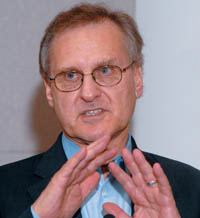
Stephen Lewis discussed the negative effects of globalization on Africa and the developed world's failure to help. |
It was a bad-news, (perhaps eventually) good-news story. When Stephen Lewis, former UN Special Envoy for HIV/AIDS in Africa, addressed a packed audience of NYU students and alumni last September during the annual Lubin Lecture, he painted a dire picture of the effects of globalization on Africa and the developed world's failure to help. Despite the gravity of the subject, Lewis prefaced his discussion with a glimpse of hope, saying, “Over time, Africa will emerge as a series of nation-states to occupy its place in the world.”
Lewis then launched into a discussion of the eight UN Millennium Development Goals, crafted by the UN General Assembly in 2000, which he used as the framework to tell the story of the millions of Africans gripped by the devastating AIDS pandemic. Despite the progress wrought by globalization, it hasn't rescued the world from disease, poverty, and conflict, so the UN devised the goals as a backup plan. By establishing long-term objectives, the UN intended to “achieve the social justice and equality that seemed otherwise so elusive," Lewis asserted. The stated goals range from eradicating extreme poverty and hunger to promoting gender equality and empowering women. Yet, the goals remain simply that. Africa's failure so far to make significant progress toward achieving them is a harsh reality.
Lewis explained that, despite the goal to eradicate extreme poverty and hunger, the World Food Program was forced to reduce its contributions to Darfur, a genocide-ridden region in western Sudan, because it was receiving neither the grain nor the funding promised by the West.
Further, child and maternal mortality rates are still staggering, and the transmission of HIV/AIDS across Africa remains rampant. Lack of access to the prevention methods and treatments that are readily available to US citizens has contributed to the continent's failure to meet the goals of reducing child mortality, improving maternal health, and combating HIV/AIDS, malaria, and other diseases. Lewis urged the audience to consider this poignant question: “Why is the life of a New York City child worth so much more than the life of an African child?”
Sharing an account of his travels to Rwanda from 1998 to 2000, following the genocide there, Lewis described his powerful emotions when three women recounted to him the acts of rape and violence they experienced. The world swore this tragedy would never happen again, he declared, but it is happening now in Darfur and the eastern Congo.
Lewis implored the developed countries to reexamine their priorities and honor their promises. “This is a world which I sometimes think is off its rocker. We are now spending between $10 billion and $15 billion a month to fight wars in Afghanistan and Iraq – and we cannot summon that amount of money in any given year to fight a pandemic that has taken 25 million lives and has 42 million people in its grip.”
In closing, Lewis said he remains hopeful for Africa's future, what with the UN considering a proposal to establish an international agency to empower women, and an increased emphasis on disease prevention and treatment. He called on the public and private sectors and celebrities and NGOs to join forces to help, and challenged audience members to assist in the relief process by visiting a developing country or raising awareness at home. “Why else are we on this planet – for the mere accumulation of wealth? I invite you to engage in the response to this pandemic because there are millions of lives at stake.” His remarks drew a standing ovation, after which he took audience questions and later met with students individually.
The Joseph I. Lubin Memorial Lectures were established and funded in perpetuity through the generosity of the late Joseph I. Lubin, a distinguished business, civic, and philanthropic leader and a Trustee of New York University. The lectures have attracted world-class leaders to NYU Stern and have served as a public forum to discuss economic, financial, and management principles and theories. |
|
|


![]()